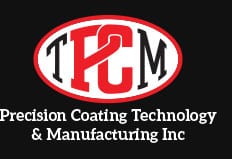9 Frequently Asked Questions About Fluoropolymer Coating Spray

Fluoropolymer—what? While the name may sound a bit alien to you, fluoropolymer coating is hugely familiar to product designers and manufacturers in many different industries around the world. Also known as polytetrafluoroethylene—or PTFE—this industrial coating compound is ideal for those seeking coating with exceptional temperature, chemical, and friction-resistant properties.
In today’s article from Precision Coating Technology & Manufacturing, we’ll examine nine frequently asked questions about fluoropolymer coating spray. After you’ve finished reading it, you’ll have a better understanding of this impressive coating material.
Q. What is a Fluoropolymer?
In layman’s terms, a fluoropolymer or fluorine polymer coating is a chemical compound that is highly resistant to chemicals, friction, heat, or abrasions and has non-stick properties. Precision application processes allow for a strong chemical bond and a wide array of uses.
There are many types of fluoropolymers, but the kinds used in most coatings are PTFE (polytetrafluoroethylene), FEP (fluorinated ethylene propylene), and PFA (perfluoroalkoxy alkane).
Q. What is a Fluoropolymer Coating?
Fluoropolymer coatings are blends consisting of high-caliber resins and dry film fluoropolymer lubricants. The finished result produces a smooth, solid, slick coating, which provides superior corrosion and chemical resistance. Some additional advantages of fluoropolymer coatings include reduced friction, resistance to galling, non-stick, non-wetting, electrical resistance, and abrasion resistance.
Q. What Types of Materials Can You Coat?
We apply coatings on carbon steel, aluminum, stainless steel, steel alloys, brass, magnesium, and non-metallic materials such as glass, carbon fiber, certain rubbers, and plastics. Some coating material types are more suited to specific substrates than others.
Q. How Are the Coatings Applied?
Most of our industrial coatings here at Precision Coating are applied using a conventional spraying method, driven by compressed air. Some of our PFA (perfluoralkoxy) and FEP (fluorinated ethylene propylene) coatings are applied electrostatically as powders. The coating material and the part are oppositely charged with electricity using specifically designed application equipment, which then adheres the coating to the object.
Q. What is the Wear Life, or How Long Will Fluoropolymer Coating Last?
Unfortunately, there’s no simple answer to this question. The answer depends on a range of factors such as the material, quantities, and application type. Our expert staff will be glad to review your project’s specifications and give you an answer. Request a quote today and fill us in about your project’s unique requirements.
Q. What Industries Do You Provide Powder Coating Services to?
At Precision Coating, we’re proud to provide powder coating services to our clients in the following trades:
- Aerospace
- Agricultural
- Architectural
- Automotive
- Hydraulics
- Medical
- Military and Defense
- Transportation
Q. Are There Different Colors Available?
While it’s important to note that most industrial coatings are primarily designed to be functional rather than decorative, we understand if you have special color requirements. If you need to have a specific color to meet a protocol or want your product to look extremely appealing, there’s a wide array of colors available for you to choose from. Just remember that some coatings will provide a superior finish with less protection, while others will do the reverse.
Q. Is Applying Fluoropolymer Coating a Quick Process?
It is! Powder coating typically requires just one coat, so it has a quick turnaround time, saving you money on materials, labor, and downtime-related costs. A single coating cures in less time, so you’ll have your equipment ready for use sooner. Powder coating also typically lasts longer than traditional wet paint and will save you money in the end with fewer paint jobs.
Q. Can PTFE Be Applied to Plastics?
The short answer? Sometimes, yes! While PTFE is primarily a metal (steel, alloys, brass, aluminum, etc.) coating, it can be applied to certain plastics and other substances if the substance’s surface is first abraded (made rough in texture) to promote bonding.
Ready for Fluoropolymer Coating Spray Services? We Can Help!
Here at Precision Coating, we’re experts at what we do. We offer spray PTFE coatings to suit a wide range of applications. Contact us today to learn more about our process or to discuss your unique specific coating project needs.

